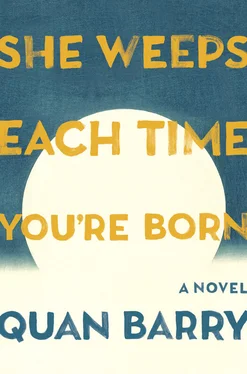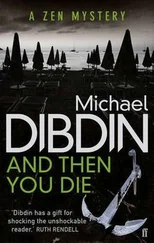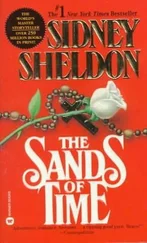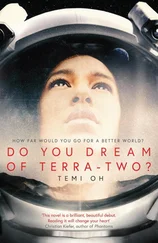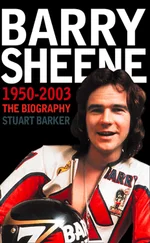When he rolled over, his eyes gleamed, the blue flecked with gold. Then he was slipping off her pants, the ring on his finger cold on her skin. She could hardly hear the sound of her own breathing through the thunder. He ran his face over the inside of her thighs, the pale blond hair of his young beard like a stiff brush, his hair light with sun, skin dark with it. The rain was erasing the outside world, leaving only this room and the bodies in it.
He put his mouth on her. She stopped breathing. She felt herself riding a wave. The long interval as it crested. She could feel her body crying, every door opening in her skin. When he pulled his head away, he was laughing. You taste like honey, he said. He reached up and kissed her on the mouth as if trying to explain.
That first time the two of them seated and facing each other. Legs tangled together. Both of them with their hands on each other’s back. Rhythmically pulling themselves closer and closer. The room abruptly illumed with lightning, their bodies incandescent in the flash. Periodically she would look him in the face. His cold blue eyes on her until the feeling swelled and she had to look away.
When she kissed his scar, the silvery light dawned in her head, her ears itching as if an insect had wormed its way down the aural canal. Then it was all there, the disembodied voices of the dead — Afghanistan, a small boy in a long shirt running away, then the sudden explosion in the Russian’s neck as the grenade went off, the concussive bang, the air like a hammer, his best friend Mikhail running toward him with the blacksmith’s iron that had been heating in the fire right when the grenade exploded, the smell of his own burning flesh filling his nose and lungs.
The moon sat squarely in the window. Already the rain was down to a light patter, outside the sounds of things dripping from a great height. The Russian put her fingers in his mouth. She could see where he had smeared her blood on his chest. Nothing about it had hurt. Lastochka, my little swallow, he said, drifting off to sleep. She had to fight to keep all the voices rising off his skin out of her head. There were so many dead by his hand in that foreign place. I hear you, she whispered. His name was Levka Zaytsev, the lion and the hare. He was nineteen years old. He had seen literally everything.
Two hours before dawn Rabbit opened the door to the room she shared with Qui in the row of flimsy rooms next to the bus depot. The moon was still in the sky. Qui was sitting in the corner milking herself into a jar, her silver hair flowing down her back like a mirror. With one hand she was squeezing the swollen orb of her right breast, with the other plucking bits from the red chrysanthemum and quietly slipping the tufts in her mouth.
THE THIRD TIME LEVKA TOOK HER TO THE HOUSE, SHE TOLD him everything. They were lying in bed. Outside, the water was rising in the streets. The daily rains had been harder than usual. Together they had waded through it to the house. At one point Levka had carried her on his back. Now in the sparsely furnished room on the second floor he was telling her about the fields of Dien Bien Phu, the little orange flags dotting the valley. He walked his fingers down her belly. The ring winked on his finger. You have to be careful where you step, Levka said. She smiled as he got closer. He made a noise with his mouth. The way he shook his fingers, as if he’d burned them, she knew it was supposed to be an explosion. One wrong move, he said. He pulled his hand away and rolled over.
Moonlight tangled in the sheets. Rabbit knew he was lying in his own world far away, that he was thinking of Mikhail running to help with the red-hot iron glowing in his fist, the smell of Levka’s flesh burning as Mikhail cauterized the wound. Mikhail who was always running to help. Running through the shadow of the Urals where they had grown up together as boys. Running out into the sector of Dien Bien Phu the French had called Huguette, near the old airfield, to help with the excavator, the machine’s left track jammed up with rocks, the little orange flags flapping in the wind as far as the eye could see, then an old wound opening up in the earth, the air transformed into a hammer, the hammer striking Mikhail.
Rabbit could feel a tension in the mattress. She knew Levka was still awake. She didn’t expect him to understand. He was the perfect audience. She reached over and kissed his scar, saw the little boy in the long shirt running away, the grenade sailing through the air. There was a man on fire, she said. I could hear him screaming. We were below deck, but I could hear him. For me, to hear something is to see it. The flames raging off him like the sun.
It has always been like this, Rabbit said. Even the three days I lay in my mother’s arms in the ground, her fingers slick with honey. Maybe it started because I had no sight. I could only hear the sound of my own heart filling the dirt, the sound like water dripping from a great height.
Those first years I listened. The world was full of them. Everywhere we went. In the paddies. In the ditch beside the road. In the temples. In the rivers. A nation of people who have been dying from war for over a thousand years. Everywhere their faces buried in the road.
Levka was still lying with his back to her, in the window the moon cocked like an ear. She closed her eyes. I don’t understand it myself, she said. I hear them stretching their voices out to me. They call to me and they tell me things and I say, I hear you. The simple act of someone hearing them, an acknowledgment, and then they can go wherever it is they go.
That dark week I almost became one. All those families swept overboard. The Cambodian who left the earth for good. The doctor lying with his broken god in his arms. The pirates’ boat exploding. Then the hold was filled with the brightest light I have ever seen and I felt a thousand arms lifting me up. All around me the waters becoming as glass.
When I woke, there was a lump on my forehead and it was night. The moon was out. It looked full, the rabbit with its long bright ears as if stamped on a coin, but I knew it couldn’t be full. We had just celebrated the Harvest Moon the night we escaped. Then I saw Son and Qui drifting on a piece of wood. Son was staring at me. There wasn’t a single wave in the ocean. The moonlight shone on the water like a white robe stretching to the horizon. It does look full, said Son, but yes, it can’t be.
We drifted for three days, each night the moon as if whole, the three of us adrift, Qui almost naked where the explosion had ripped her clothes off, her milky-white skin without a single bruise. When the sun rose that first morning, Qui climbed onto my piece of wood, shielding me with her body that never burns, the sun hammering down on us all day without pause, Qui’s body always the same ghostly hue. I imagined from a distance her body flashing like a mirror in the sunlight.
On the second day Qui lifted her head and pointed. A boat, Son shouted. I looked up. It was so close I could see the people on board. The boat was riding low in the water. I couldn’t see the boat itself for all the people spilling out on every surface, a ship made entirely of people. I know they saw us. I could see the desperation in their faces. They didn’t stop.
How did we keep going? When I was thirsty, I would take Qui’s breast in my mouth. It tasted like mountain air passed to a man floating hundreds of feet below water. Sometimes I would pass the milk from my mouth into hers.
The second night I heard something chittering in the waves. Then I saw them — a family dancing in the watery light of the always-full moon. Dolphins, their skins like silver. All night they stayed with us, keeping watch.
The morning of the third day the dolphins disappeared. One minute they were singing their high-pitched songs, then I closed my eyes, and when I opened them, the waters were empty. I could see seabirds circling in the distance. I watched them get closer. Among them there was one dark bird, the others white as salt. Then the dark bird left the group and flew toward us. None of us said anything even after the bird landed by my shoulder. I put my hand on the elegant S of her neck, her feathers fully formed. Binh, I said. The bird that had been traded for a red wedding dress. Rabbit looked out the window. She died just last year, Rabbit said.
Читать дальше
